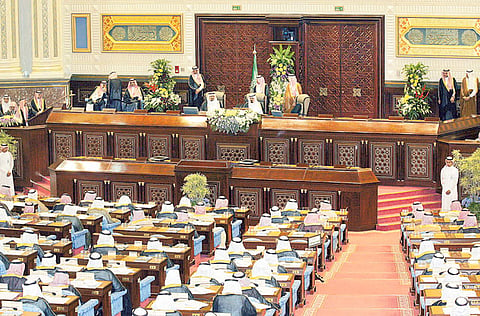Women’s presence in Shura delayed by logistics
Public expectation and lack of parliamentary experience are key challenges

Dubai: The commencement of the new Consultative Council in Saudi Arabia, which for the first time will have 30 female members, is still awaiting the completion of modifications in the building to segregate women and men, according to Saudi women activists.
The segregation is expected to be one of the obstacles facing the new women members, who were allocated 20 per cent of the 150-member advisory body in the conservative kingdom last month, activists added.
“What is the difference between women writing in media [outlets], and women sitting in the parliament and writing papers?” asked Saudi writer and columnist Hala Al Dosari.
“At the end, the issue became [just] names written on paper,” she told Gulf News. By doing so, “we have not enriched the [political] experience of women and we have not engaged them in a real interaction with men in the decision-making process,” Hala said.
Saudi King Abdullah Bin Abdul Aziz issued a decree last month requiring at least 20 per cent of members to be women. The decree also noted that they must observe Islamic law and be properly covered, adding that they will enjoy full rights in the council, have a separate entrance to the chamber and sit in a special section apart from men.
However, it was not confirmed yet whether the new members have already taken the oath in front of the Saudi King or are still waiting, amid conflicting reports.
Yet, all Saudi women activists and political analysts praised the fact that there is a quota for women and that there are female parliamentarians.
“This is a very important and a powerful move,” articulate Saudi academic and women activist Hatoun Al Fassi told Gulf News. Now, “we came out of the predicament of whether to name female members to Shura Council or not,” she said in reference to the previous debate on the appointment of women to parliament of the conservative Kingdom.
Interestingly, the presence of two senior princesses among the new female members “will create some sort of balance with the parties against the royal appointment,” said Hatoun.
Both Princess Sarah Bint Faisal and Princess Moodhi Bin Khalid, daughters of the late kings Faisal and Khalid, are among the first group of women to enter the Saudi Shura Council. The two have a long history in social work and their presence is a sign that the Saudi leadership is determined to support the presence of women in the Shura, noted women activists.
A group of hardline clerics gathered outside the royal court last month shortly after the appointment of the new members of the Shura Council to “give their advice” to the leadership – a term that was interpreted in social media as an attempt to voice their objection to the women’s appointment in the conservative society.
The opposition to the appointment is considered among the main challenges facing the female members, activists noted.
However, some political anaylsts expressed different opinion.
“I would like to emphasise that if there are regressive groups, this doesn’t mean that the society will be at a standstill for the sake of this regressive minority,” said Wahid Hamza Hashim, politics professor at King Abdullah Aziz University in Jeddah.
The Saudi Shura Council members are appointed every four years.
Without naming any person or group, Hashim added “since the creation of the earth and throughout the human history, there are groups who oppose change and stand against development and progress.”
Hashim, who praised the “unprecedented” and the strategic shift in Saudi women’s status, said ‘societies can’t stop because of these groups, and they should be contained by all means.”
However, even if the efforts of the new female parliamentarians are not hindered by the opposition to every step they might take, they need more time than men to know the ins and outs of the parliament, including the power centres, voting mechanism, how to negotiate and how to win, noted women activists.
“You also have the high expectations of [many] Saudi people from the new female members, and they will not excuse any mistake or shortcoming,” said Hatoun. “This will put psychological pressure on them [female members].”
Hashim, meanwhile, said usually high expectations accompany new changes, and that those achievements, in most of the cases, don’t match the high hopes.
“This is a fact. But this doesn’t mean that the high prospects can’t be met, or the expectations from the new female members, whether as individuals or a group, won’t see the light,” he explained.
However, most of the appointed women members are science-oriented people, as their majority are professors, medical doctors and pharmacists.
People with a science-oriented mind are not close enough to the issues that occupy the public, or legal and social matters, activists noted.
“You don’t see women who write about public affairs or those whose pens are known for social criticism in the parliament,” said Hatoun.
New female members were appointed to reflect different regions and different schools of thought they represent, she added, such as the conservatives and the moderates.
“I don’t expect them [female members] to take strong moves or introduce dramatic changes in the status of women” in Saudi Arabia, said Hala.
But, Hala added, the new female parliamentarians “will pave the way for their compatriots”.
Sign up for the Daily Briefing
Get the latest news and updates straight to your inbox



